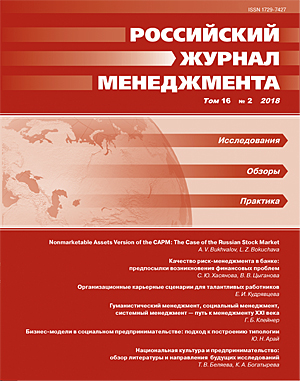Национальная культура и предпринимательство: обзор литературы и направления будущих исследований
DOI:
https://doi.org/10.21638/spbu18.2018.206Аннотация
В статье представлены результаты анализа основных исследований, посвященных связи национальной культуры и предпринимательства, опубликованных в ведущих научных рецензируемых журналах по менеджменту, предпринимательству и международному бизнесу за 1988–2018 гг. Национальная культура играет важную роль в наблюдаемых различиях в уровне развития предпринимательства в разных странах. Теоретическими основами исследований в данной области служат три подхода: обобщенных психологических характеристик, связанных с предпринимательством, социальной легитимности предпринимательского поведения и неудовлетворенности существующим положением индивида. По результатам анализа публикаций приведена сравнительная характеристика основных подходов к измерению национальной культуры, выделены три направления исследований национальной культуры и предпринимательства, в которых последнее рассматривается на уровне страны, фирмы или индивида, а также определены методологические особенности изучения данной проблематики, связанные с проведением межстрановых сравнительных исследований и измерением переменных на разных уровнях анализа. На основе полученных результатов предложены возможные направления будущих исследований в данной области.
Ключевые слова:
национальная культура, предпринимательство, обзор литературы, направления будущих исследований
Скачивания
Библиографические ссылки
Translation of references in Russian into English
Загрузки
Опубликован
Как цитировать
Выпуск
Раздел
Лицензия
Статьи журнала «Российский журнал менеджмента» находятся в открытом доступе и распространяются в соответствии с условиями Лицензионного Договора с Санкт-Петербургским государственным университетом, который бесплатно предоставляет авторам неограниченное распространение и самостоятельное архивирование.





